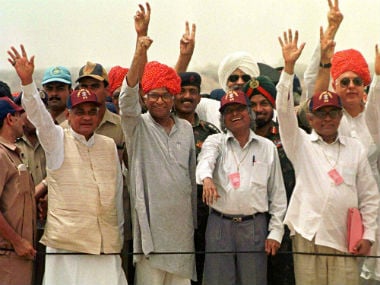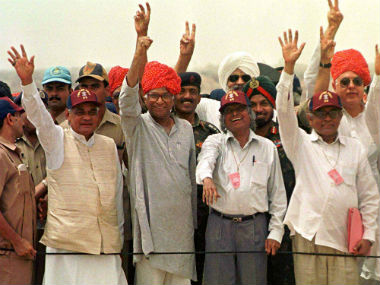Three things happened almost back to back in recent weeks. North Korea’s Kim Jong Un created history by being the first leader to cross over into South Korea to sign onto an agreement for a nuclear-free Korean peninsula. Less than ten days later, President Donald Trump announced reimposition of sanctions on Iran, in a move that threatened to open up a nuclear Pandora’s box in the Middle East and beyond. And, a few days ago, much of India celebrated the 20th anniversary of the Shakti tests of 1998 that catapulted India into the status of a nuclear power. [caption id=“attachment_2778202” align=“alignleft” width=“380”]  File photo of former PM Vajpayee, defence minister George Fernandes, APJ Abdul Kalam, and R Chidambaram after the tests. Reuters[/caption] The commentaries on that last event were as varied as they were on the day India decided to test. Some analysts decried the reliance on minimalism, claimed that the thermonuclear tests never took place and that India had boxed itself into a corner by giving up the right to test further as per the Indo-US nuclear deal. Others while welcoming the status that the tests had given India argued that nuclear weapons had not been able to address the troubling question of Pakistan’s continued sponsorship of terrorism. This view was propagated by yet others who argued that while nuclear weapons gave India a certain “existential security”, it did open the country to unconventional attacks. In other words, India could not launch a war into Pakistan every time it committed an act of terror. From top to bottom, here’s the thing. The lessons of North Korea and Iran offer two of the most interesting cases of the value and political use of nuclear weapons. North Korea over the years, suffered severe sanctions but had the ability (and assistance) to eventually demonstrate that it has an effective nuclear weapon that could be mounted on a missile that could reach the United States territory, and certainly reach Japan and South Korea. Having demonstrated this to everyone’s satisfaction—or consternation, depending on which capital one is in—the North Korean leader decided to cash in on it. Thus the historic meeting and grand media appearances. He has yet to give anything up, but he is going to get a meeting with Trump and the status that goes with it. That’s the political value of a real and accepted ‘capability’ to make and deploy nuclear weapons. From now onwards, it’s a process of hard bargaining. As the late K Subrahmanyam succinctly put it, nuclear weapons are the currency of power. It’s a tradeable commodity as long as you don’t actually use it. Contrast that with Iran. The Obama administration deal with Tehran halted the Iran programme in its tracks by curtailing its most important element—the ability to enrich uranium to weapons-grade level. Essentially, the hard-fought deal—called the Joint Comprehensive Plan of Action—prevented Iran from assembling its first workable nuclear bomb in a possible three months time and delayed that to at least a year. In other words, if Iran had to ‘break out’ of the agreement, it would give the international community at least a year’s warning to start taking action. All indications are that Iran kept to its side of the bargain. But it did fire—probably unsuccessfully—a medium-range missile. Worse, it did this just weeks after the inauguration of Trump, whose ire against Iran had been more than evident during his campaign speeches. The reaction was predictable, and the threat of sanctions loom again. In simple words, Iran’s ability to convert its nuclear programme into political gain was in direct proportion to its actual capability – which was nascent. And here’s the thing. Regardless of its lack of a nuclear capability, Tehran continued to sponsor terrorists/non-state actors across into Syria and even Afghanistan. Could Iran have increased its terrorist activities under a nuclear umbrella? Perhaps, but there’s only so much you can achieve by supporting terrorists. Coming to India’s Shakti tests. While India’s decision to conduct the tests at that time was governed by many factors—not least of which was the threatened indefinite extension of the immensely discriminatory Non-Proliferation Treaty—but the Shakti tests were conducted with a clear political strategy. Against all popular perceptions, the letter from prime minister Vajpayee to president Bill Clinton cited China as the first threat, and Pakistan as the second. This was a time when the Clinton administration was facing flak on China’s apparently successful theft of the design specifications of the country’s top seven nuclear warheads. Congress formed a committee thereafter to probe the whole issue and issued what was called the Cox Committee report. It was a good time and a bad time for the Indian tests. Clinton’s outreach to China was hardly popular nor was the addition of yet another nuclear power to the rest. Even as furious non-proliferation pundits successfully imposed sanctions on India, the Strobe Talbot and Jaswant Singh talks had already begun. By 2011, secretary of state Hillary Clinton was urging India that it was time to take the lead in a region where China had begun to step in. In sum, a growing economy and an international situation helped India in this situation. But in the end, it was the fact that India had delivered a fait accompli, and it had nothing very much to do with whether or not India had a thermonuclear ability. India had broken into the nuclear club with a clear capability, and it simply could not be rolled back no matter what. The US, therefore, did the next best thing. It co-opted it. The Indian position was further cast into stone with a draft nuclear doctrine that reiterated Vajpayee’s commitment that India would never use nuclear weapons first and committed India to a “credible” and a “minimum” deterrent. Credibility had been more than demonstrated by the Shakti tests and an ongoing missile programme. This was bolstered by the assurance that India would react in full measure to any threat or use of nuclear weapons. “Minimum” was written in because one of the most brilliant minds of the time—Subrahmanyam—understood that India could not and should not go down the road to a nuclear arms race, piling up hundreds of bombs of different sizes to no good effect. His understanding was clear. Even the threat of delivery of one weapon on a large city is good enough to persuade even the most sinister enemy to desist. With luck, this wisdom will continue to lie at the heart of our nuclear policy, naysayers notwithstanding. At the very heart of the Indian position was the stated objective of the tests. The draft doctrine said, “The fundamental purpose of Indian nuclear weapons is to deter the use and threat of use of nuclear weapons by any State or entity against India and its force.” There it was. Nuclear weapons were not ever intended to stop terrorism but to deter others from using it. Nonetheless, let’s argue the reverse. Could India have stopped Pakistani terrorism if neither had nuclear weapons? That’s a very big “If”. Certainly, a full-fledged war may have taught Pakistan a lesson – but remember that our capability for full-fledged war was always limited, 1971 notwithstanding. And nations, much like people, are not prone to learn lessons easily. The point about nuclear weapons is that calculation of benefit and risk is all in the mind of the parties to the conflict. For the US, it ended in its co-opting of India (almost) into the nuclear fold. Its likely to eventually coopt North Korea again for its own ends. Meanwhile, India has the advantage over Pakistan—and sometimes over China—of being a responsible state with absolutely no territorial ambitions. China is seeking a change in the status quo and has to engage in mind games with the US in determining the exact value of a weapon that no one can actually use. That’s a game that will be worth watching. Meanwhile all New Delhi has to do, is to keep its uranium dry.
The point about nuclear weapons is that calculation of benefit and risk is all in the mind of the parties to the conflict.
Advertisement
End of Article


)

)
)
)
)
)
)
)
)



